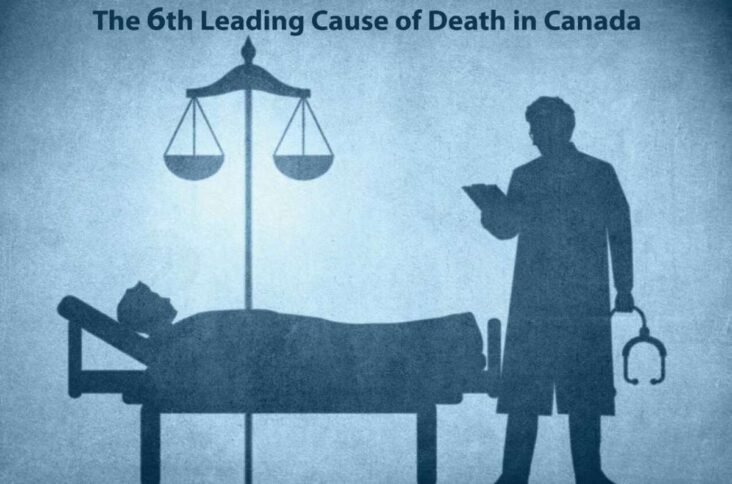
By Lynn Frances
Kiano Vafaeian was depressed—at 23, with diabetes and the loss of vision in one eye, he didn’t have a job, a girlfriend, or much of a future if you were to ask him. But he did have one thing planned: his death—scheduled for September 22, 2022. Kiano’s 46-year-old mother, Margaret Marsilla, only found out about his plan after she logged into his email account out of concern. She read the doctor’s instructions: “Please arrive at 8:30 am. I will ask for the nurse at 8:45 am, and I will start the procedure at around 9:00 am. Procedure will be completed a few minutes after it starts.” Kiano was told he could bring his dog with him as long as someone would be present to take care of it after his death.
The procedure entailed administering two drugs—first, a coma-inducing agent. Then, a neuromuscular blocker would stop Kiano’s breathing. He would be dead in under ten minutes.
Two weeks before the appointment, Kiano’s mother called the doctor scheduled to kill her son. She recorded the call and shared it with The Free Press. Posing as Joann, she told the doctor she was diabetic and blind and that she wanted to die by Christmas. The doctor told her she would qualify for MAiD if she were over 18, had an OHIP card, and was experiencing “suffering that cannot be remediated or treated in some way that’s acceptable to you.” He then stated that he could conduct his assessment via Zoom. Fortunately, after Marsilla shared her story publicly, the doctor texted to cancel her son’s death.
She saved her son’s life. But other families have not been so fortunate.
For example, Alan Nichols, as reported by The Associated Press, “was basically put to death” while hospitalized for suicidal ideation, according to his brother. When applying for euthanasia, Alan cited hearing loss as his only medical condition.
These procedures are done under Canada’s Medical Assistance in Dying (MAiD) program. MAiD was legalized in 2016 with Bill C-14, following the 2015 Supreme Court ruling in Carter v. Canada that deemed a blanket ban on assisted dying violated the Charter of Rights and Freedoms.
Initially, a physician would only give lethal medications to patients who met all criteria: a serious illness or disability, in an “advanced state” of decline that could not be reversed, experiencing unbearable physical or mental suffering, and when natural death was “reasonably foreseeable.”
When critics expressed concern that this program would be extended to people who were depressed and stressed, Prime Minister Justin Trudeau declared this “simply isn’t something that ends up happening,” citing jurisdictions elsewhere in the world with similar laws.
Well, today, this is something that is happening. In March 2021, Bill C-7 lifted the criterion that natural death must be “reasonably foreseeable.” Then, in early 2023, the federal government’s Special Joint Committee on MAiD reported on the proposal to expand euthanasia on March 17, 2024, to Canadians whose sole condition is a mental disorder.
After this announcement, Dr. John Maher, a psychiatrist at the Canadian Mental Health Association and editor-in-chief of the Journal of Medical Ethics in Mental Health, thoughtfully commented: “Inducement to suicide while denying mental health care to two-thirds of Canadians who urgently need it is an unconscionable failing. MAiD for mental illness violates the Supreme Court requirement to preserve life whenever possible. Directly undermining suicide prevention efforts is an insidious perversion of our mental health care duty. Mental illness is treatable, and death is not treatment.”
More disturbing than expanding MAiD to qualify the depressed and mentally ill, it was considered (thankfully not approved) to extend euthanasia to babies. Dr. Louis Roy from the Quebec College of Physicians told the Commons’ Special Joint Committee of MAiD that his organization “believes that minors could, with their tutors or parents, request MAiD based on persistent and intolerable suffering. The same option is for babies born with severe deformations or medical syndromes whose life expectancy and suffering are such that surviving is null. The Netherlands uses this option, which we could explore. The Committee addressed the issue of elders tired of being alive, what we in geriatric care call sliding into existential suffering or emptiness. We don’t have a clear answer for these cases, but we would like to continue researching.”
In December 2022, Christine Gauthier, a veteran and former Paralympian, disclosed to a House of Commons Committee that after five years of seeking assistance to install a wheelchair ramp at her home, Veteran Affairs offered her MAiD instead.
In the same month, the CEO of the Mississauga Food Bank, Meghan Nicolls, said, “People are coming in asking about MAiD for help ending their lives, not because they are sick, but because they can’t afford to eat.”
In February 2023, MP Ed Fast presented Bill C-314, the Mental Health Protection Act. “All mental disorders would be excluded from eligibility for a lethal injection through MAiD to prioritize suicide prevention over suicide provision and ensure death is never an acceptable, state-sanctioned option.” Bill C-314 was defeated in the second reading in October 2023: 167 MPs against and 150 in favour.
One of Canada’s leading experts on mental illness, Dr. K. Sonu Gaind, Chief of Psychiatry at Sunnybrook Health Sciences Centre and former president of the Canadian Psychiatric Society, noted that the Trudeau government has dismissed his concern over no real, scientific way to distinguish types of suicidal ideation. He declared, “We now provide MAiD to more people than any other country on the planet.” In October 2023, over forty experts, including Dr. Gaind, penned a letter to MPs denouncing the Trudeau government’s Euthanasia Committee and its ideological push for radical euthanasia expansion. “The Committee’s recommendations place Canadians … at risk of avoidable premature death, and if enacted, will be responsible for facilitating state-provided deaths to marginalized and suicidal Canadians who would have recovered.” Dr. Gaind later presented one of six Briefs to the Special Parliamentary Committee. “There remain no meaningful safeguards to prevent vulnerable and marginalized individuals, who could get better, from accessing MAiD during periods of despair and suicidality fueled by mental illness.”
With concern about accuracy, Isaac Lamoureaux of True North reported in December 2023 that Statistics Canada’s annual mortality datasets do not include medically assisted deaths. Because the World Health Organization lacks an official classification for such deaths, physicians code MAiD deaths to the underlying condition for the MAiD request. Therefore, someone with cancer who dies by MAiD is classified as a cancer death.
According to Health Canada’s Fourth Annual Report on Medical Assistance in Dying in Canada, there were 13,241 reported cases of medically assisted deaths in 2022—higher than any other country—accounting for 4.1% of all deaths in Canada.
If Statistics Canada included MAiD as a cause of death, it would be the sixth leading cause of death in Canada in 2022. The total number of deaths since the legalization of MAiD was reported to be 44,958.
Ironically, inside the report’s front cover: “Health Canada is the federal department responsible for helping the people of Canada maintain and improve their health. Health Canada is committed to improving the lives of all of Canada’s people and to making this country’s population among the healthiest in the world as measured by longevity, lifestyle, and effective use of the public health care system.”
Jeff Gunnarson, Toronto Vice-Chair of Campaign Life Coalition, writes, “Our healthcare system is becoming a deathcare system. I remember when proponents of euthanasia and assisted suicide promised that MAiD would only be available for people who were terminally ill. Yeah, right. When we sounded the alarm, we were accused of fear-mongering. Look where we’re at now. Imagine—legalized eugenics in Canada. We are beyond hurtling down the slippery slope as Nazi Germany did in the 1930s [that started with the sanctioned mercy killing of a loving father’s severely handicapped daughter]. We’re falling off the cliff. We know the Trudeau Liberal regime is committed to normalizing euthanasia-on-demand and expanding access to those with mental disorders. We must hold firm in faith and prayer and commit to action by reaching out to local MPs to reverse course on this reckless expansion of euthanasia in Canada.”
How does our consideration of MAiD meet the sacred value of life? What is the purpose of life (not to suffer?), how do we determine the best timing for death, and, if we cannot, who decides?
On February 15, 2023, the Special Joint Committee on Medical Assistance in Dying (AMAD) reported on five mandated issues: advance requests, access to MAiD for mature minors, access to MAiD for those whose sole underlying medical condition is a mental disorder (MAiD MD-SUMC), the state of palliative care, and the protection of people living with disabilities. In November 2023, the Committee completed its review of Canada’s readiness to implement MAiD MD-SUMC and will deliver its report in January 2024. Then the government responds. Contents and recommendations are embargoed until then.



